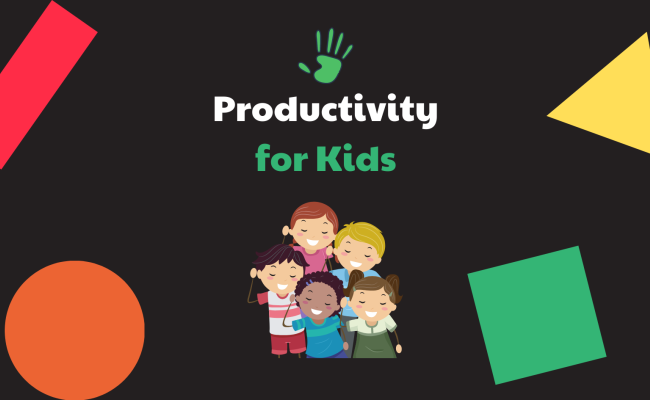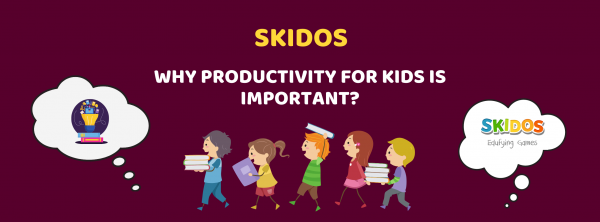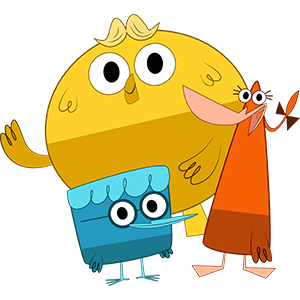Productivity matters not only for adults, but it is also an essential skill that youngsters need to possess, especially when young children may not be motivated to do what they’re supposed to do because of many reasons.
It is often easy for a child to get distracted and forget what they have to do, or they just get confused, tired, upset, hungry, or disinterested in doing something; therefore, they ignore their tasks and lose productivity.
| >>> You might also interested in: How to teach kids gratitude: 10 Activities, Tips for Parents.
If kids continue missing deadlines and fail to complete tasks constantly, as parents, we shall be worried that they will not perform well at school and not be ready to compete for future work. That is when parents know they should teach kids about productivity early on since their childhood.
Furthermore, productivity also comes to the rescue during the time of COVID-19 pandemic lockdown when the world is struggling with virus Corona. The world seems to enter into a pause mode as a result of the COVID-19 pandemic that many schools worldwide offer online classes on a daily basis so that children would attend school remotely.
Lessons and homework are essential but children need more activities to keep them occupied while parents must work from home. At that time, parents also need support from kids so as to both work and babysit the kids at home; therefore, children and parents need to excel productivity skills for kids to get things done better with less of time.
5 Ways to Teach Productivity Skills to Your Kids
Because productivity is very important for kids, Skidos would like to point out 5 simple habits that parents can help children to make in order to have a more productive life.
Would you want your kids to grow into successful adults? Let’s create positive parenting practices to insert big influences into your kids. Skidos would like to suggest 5 tips to build your habits to increase your productivity in life and have great impacts on your children.
1. Make a to-do-list every morning
How kids can be productive at home? Being a parent, you are pretty busy to find the balance between work and family life, thus, if you know what needs to be done within a day, you will not spend unnecessary time figuring out what to do. That is when a to-do-list takes effect. Making a to-do-list may NOT cost you more than 10 minutes, however, it is so helpful that you know what you need to accomplish for a day.
With making to-do-list every day, you can find yourself extremely relaxed without feeling guilty about not completing any tasks and teach your kids to follow your great practice of making a to-do-list. You can work together with your children to help them create a time-table of productive things to do on their own. Let’s focus on their regular school routine which they are used to. A time-table will teach children the importance of not wasting precious time and have some time granted for relaxation, leisure and physical activities. As a result, your children will gain significant organizational and productive skills over time.
Tips: You can use different colors to design your list; for example, green color for your work-related tasks, blue color for personal tasks, yellow color for housework tasks.
2. Ask what’s next
How To Make Your Kids Responsible And Productive? After teaching kids how to make to-do-list to organize their time for doing all the things they got to do, now it is time to break down the list into different priority levels to know what they should do first and what’s next.
Parents can teach children how to break down complex tasks into small simpler steps and manage them by completing those simpler steps, one by one. Just like puzzles, complex things when being separated into small pieces seem to get easier to solve and your kids will find it less hard to complete their tasks.
Parents shall keep encouraging children to answer the question “What is the next action”, and as the time goes by, they will start asking themselves the same question, which will help them form the habit of prioritizing steps to solve a problem and assist them to learn productivity and problem-solving skill. Kids then can do well to resolve various issues which range from common life situations to work-related problems.
3. Home workout to help with productivity for kids
Staying at home all day can make children feel stagnant and lead to a lethargic life. Parents can help kids to be more active and productive by arranging physical activities for kids to do exercises and keep fit. Devoting at least 10-15 minutes per activity per day to physical workout like running, jumping and skipping ropes is very useful to keep kids healthy, active and productive. Parents can try to redesign some rules of the workout activities for it to be funnier, so that children can really enjoy doing workout and later build up their habits of doing exercises.
4. Play educational games – Teaching Children Productivity Through Technology
You really want to teach your kids about productivity, let’s gamify the process. Parents can search for games that require children to apply analytical knowledge and problem-solving skills which shall ignite the sense of productivity in children. Scrabble, board games, quizzes, math puzzles are of your great choices which are both fun and educational.
You can try SKIDOS games and probably like many other parents, you will be assured of a productive, safe and ad-free screen time for your kids. Feedback from parents & teachers worldwide & our own data studies tells us that children who play SKIDOS educational games have improved their productivity and many other important skills. Children can enjoy moving up levels while enhancing their math, critical thinking & reading skills.
5. Let your children help with household chores.
When our children are young, parents should teach them to do household chores and most importantly, to teach your kid how to be productive when doing housework. Parents can teach kids about productivity by showing your own example. Do not spend a lot of time mopping the floor without cleaning the floor with the broom first, for example. Your child sees how parents do, mimic parents and know how to do things in a right and productive way. Everything starts with the parent.
Remember that children usually have to do chores they do not get paid for, but sometimes, parents can reward children for doing chores better than usual or doing more chores in the given time. They can receive allowances, but they are for better performance and extra chores because as a family, we must all contribute to the upkeep of our home. Start doing this when your children are young, while they still think it’s fun and later your children can learn about productivity and responsibility at the same time.
In short, for children to grow up and become productive and successful, it really takes a great deal of time and effort. Parents should stay patient and supportive all the way long. Remember that your children may NOT turn into a productive individual after one night, however, with your guidance and assistance, they shall grow more productive more than ever. Skidos hopes that after reading this article, many parents and children can get some useful tips from this to become more productive together!



